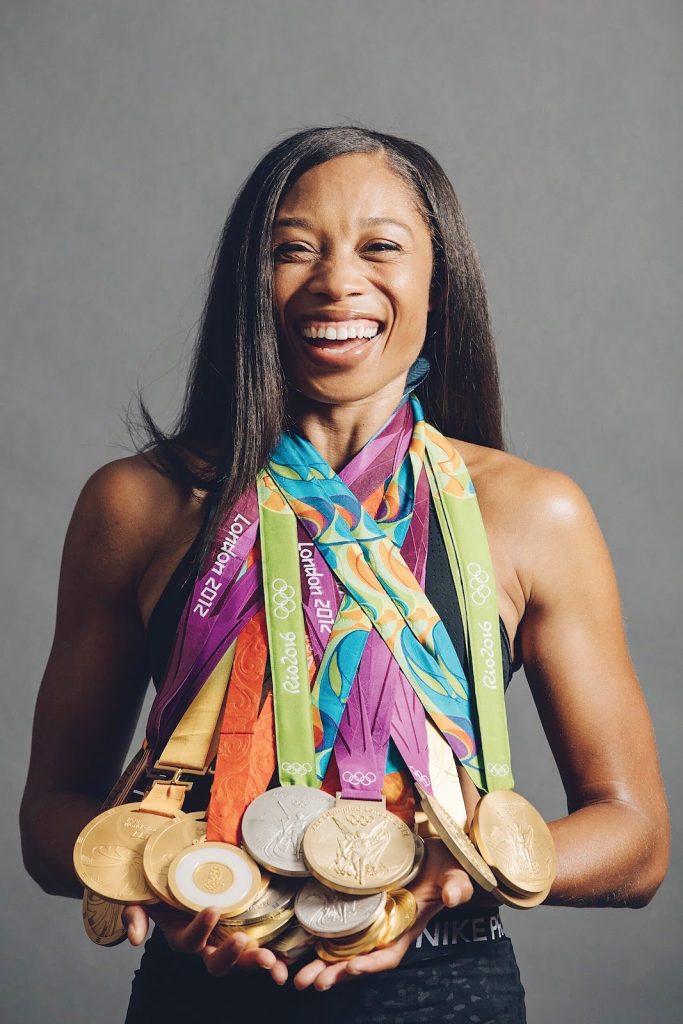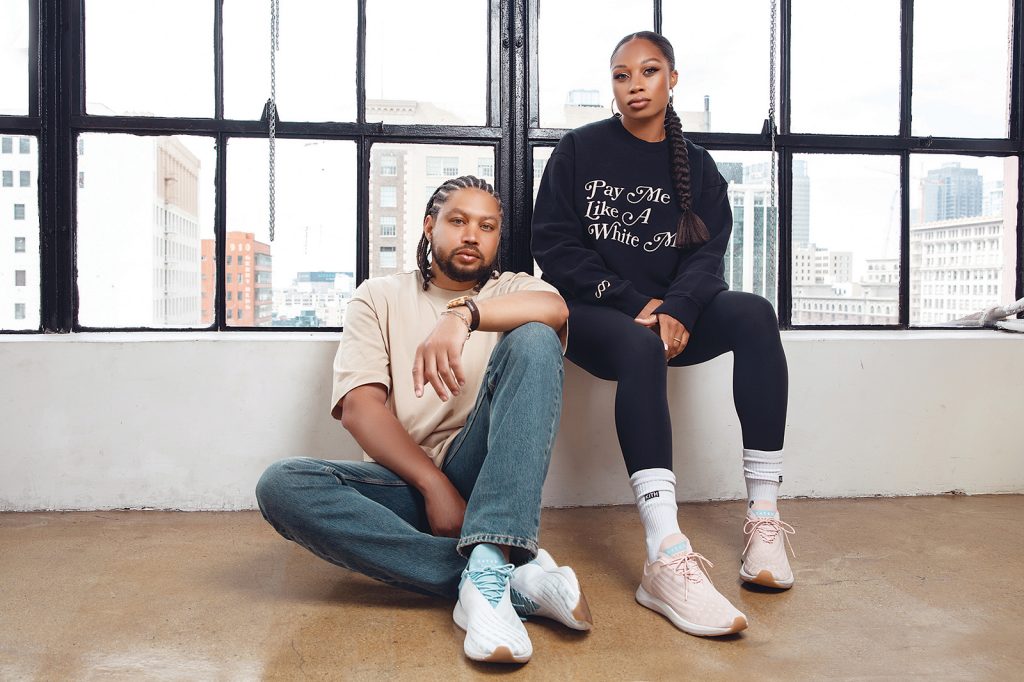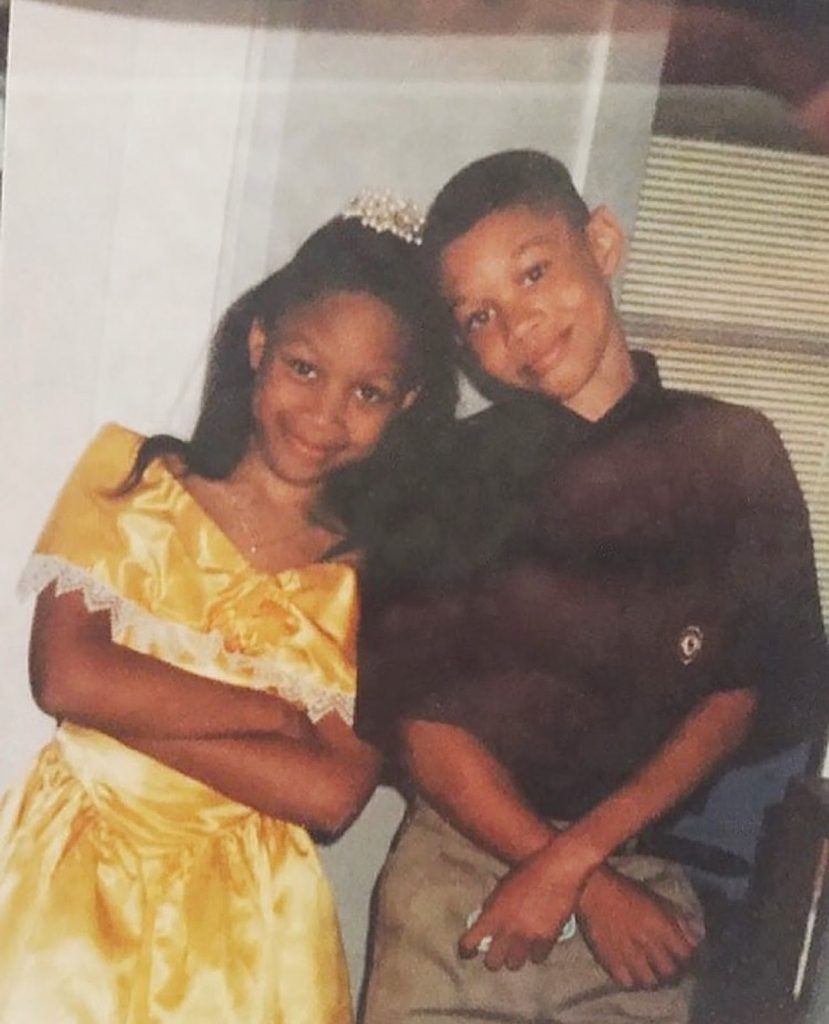To be a winner, you must know how to take things in your stride—whether on the running track or in the boardroom. As an all-star athlete who has also launched a successful new sneaker brand, Allyson Felix—who won a record-setting 31 international medals in individual and relay events—knows all about both arenas.

Saysh sneakers don’t only take into account the female foot; the company’s Maternity Returns policy recognizes that pregnancy can cause a long-term change in shoe size—and offers a free replacement pair in the new fitting. That generous move saw the company nominated for a 2023 Glossy Fashion Award for Best Corporate Social Responsibility Program.
As they researched the market, the sibling entrepreneurs were surprised to discover “that shoes have not been made for women,” company president Allyson tells Waymaker Journal. “Basically, what that means is a shoe is built off of a last, which is just a mold of a foot—and it’s the mold of a man’s foot that is used to make women’s sneakers.”
That wall of women’s sports shoes you see for sale in a store is “actually just marketing,” she says. “It’s a man’s shoe that is being marketed to a woman for her to believe that there is some difference in it, and it’s made to be for her.” Saysh is different, she adds: “Our shoes are completely made to fit the form of the female foot and address the differences in our feet, and really to push the industry to start doing that and not seeing women as an afterthought.”
Women really deserve… companies to not take advantage of them.
WES FELIX

With such an ambitious goal, how did the Felixes go about things? “You just take one step at a time,” Wes says. “When we started this, we didn’t know what we were getting into, but I knew what’s the first step. And we didn’t so much get hung up on how would we ever complete step seven or step 10. We just said, ‘We’re just going to take one step 10 times or as many times as we need. So, let’s start with step one.’”
That first step was how do you even make shoes? Having done some branding work with a footwear company earlier in his career, Wes had some awareness of “at least how smart the people were who were doing it, how hard they were working.”
Development was helped with input from a couple of women who had previously worked at leading footwear companies in their early days. “And without them, there’s no way we could have ever done this… It wasn’t because Allyson was famous that they wanted to help; it was because Allyson was courageous,” he says.
“It was because Allyson stood up… They didn’t feel like they were treated the way they should be treated as women, and they felt like they were overlooked. They helped us to realize what the real problem was we were facing. It wasn’t just trying to make Allyson shoes to wear in the Olympics, but to really make shoes for women.”

Maternal mission
Launching in 2021, Saysh was born out of a conflict that ended Allyson’s long-time sponsorship with Nike. Wanting to start a family after years of competition, she was concerned doing so could impact her contract. “In track and field, there has been this culture of silence around pregnancy and starting families and just hardship from a lot of women,” she says: women athletes have faced having their contracts being put on hold, not being able to secure new ones or having to hide their pregnancies.
In an April 2022 TED Talk since viewed more than 700,000 times, Allyson tells of going out training at 4 a.m. one day in 2018, when no one else was around because she was six months pregnant and feared that if the news got out that she was expecting a baby, it could affect her sponsorship deal.
As she talked further with Nike, her emphasis shifted from her personal agreement to the broader issue of maternal protection for others. She penned an op-ed for the New York Times in 2019 that was instrumental in Nike introducing a new maternity policy for sponsored athletes and other companies following suit. It also left her without a sponsor.
This is a huge opportunity for us to be the ones to create change instead of relying and depending on someone else.
ALLYSON FELIX
With six Olympic golds from four Games at that stage—she’d add more medals at her last, 2020 Olympics in Tokyo, for which she was seeking a sponsor—it was discouraging to find little interest from other companies. When Wes first suggested they go out on their own, “it felt very big,” she says. “But the more I sat with it, I realized, ‘No, you’re absolutely right. This is a huge opportunity for us to be the ones to create change instead of relying and depending on someone else to do it.”
With the swoosh behind her, Allyson was taken on by Athleta, and when she earned a gold and a bronze in Tokyo to close out her Olympic career, she was wearing her own new Saysh spikes.
As the most decorated American track and field athlete of all time, Allyson’s complete list of achievements in the individual 200 and 400 meters and 4×100 and 4×400 meter relays could stretch around a quarter-mile track multiple times.
Eleven Olympic medals—seven gold, three silver, one bronze—from five consecutive Games. Twenty world championship medals. Ten-time national champion. IAAF Female World Athlete of the Year and one of Time magazine’s 100 Most Influential People of the Year. That’s just the highlights.
Wes was no slouch, either. He was 200-meter regional champion for two consecutive years while at the University of Southern California, where he earned a degree in political science. After three years as a Nike runner, he founded Evolve Management Agency in 2009, later managing his sister.
Funding their new endeavor wasn’t easy. “Raising money as a Black woman in this space is so difficult,” says Allyson. “I can’t tell you how many pitches and meetings [we had], going into rooms where you just don’t feel seen.” Some were quick to dismiss the new company as “just a different version of Nike, or Nike for women, and it’s like, ‘No, that’s absolutely not what we’re doing here.” She recalls showing the new Saysh designs and having some of those in the meeting suggest their 13-year-old daughter could give some feedback. “And it’s like, is there no one on your team… you’re going to leave this decision in the hands of a child?”
Wes remembers wasting “a lot of time” with people who wanted to meet Allyson because she was famous but who weren’t seriously interested in the business opportunity. Then there were those who assumed Saysh was like every other celebrity-founded brand and wanted to know who was actually going to run the business. The idea that they weren’t long-term serious “for me, was one of the most insulting parts of it that I wasn’t expecting,” says Wes. “Everything [they] just said is the total opposite of how an athlete runs their life. And [they] certainly don’t understand us at all if [they] think that we’re gonna come in and spend six months and then get bored and then go do something else.”
Team time

Both siblings say that their athletic backgrounds helped prepare them for the challenges of the business world in some ways. For Allyson, it has been the preparation and persistence that were required, the behind-the-scenes training that produced the winning results on race day.
Wes adds mental discipline to his sister’s list of athletic assets. He remembers the days when the last 100 meters of a quarter-mile workout hurt so bad, and he just wanted to stop. “You are questioning your whole existence,” he says. “So, what are you gonna do? Are you gonna keep running, or are you gonna step off the track?” Wes had already answered that question for himself back when the alarm went off at 5:15 a.m. for another early training session—“you just want to go back to sleep, and you’ve got to have that conversation with yourself that refocuses on your goals.”
When you’re in your purpose, you will impact people.
WES FELIX
Simply don’t quit, he urges. “You just don’t know what’s right on the other side. Each day, do your best to take one step towards your passion… You probably won’t necessarily end up rich and famous… [but] you’ll realize it’s not about that at all. When you’re in your purpose, you will impact people, and there won’t be anything better than that in your life. So just take one step towards your passion, don’t stop, and you’ll wind up right where you’re supposed to be.”
Then there is the importance of teamwork, he adds. Athletes compete individually, but at the same time as part of a team: “You’ve still got to trust your coach. You’ve still got to trust your strength coach, your physio, [and] if you’re at a professional level, your management.” Forget the idea you can do it all on your own, he says. “The only way you’re really going to get to that place you can actually ultimately get to is by saying, ‘Hey, I don’t know… I need you to help me out.’”
Wes also notes the importance of what you might call cheerleaders—outsiders who encourage you to keep going. He acknowledges those “who were willing to be open, who were willing to say, ‘It’ll be hard, but you can do it,’” as they worked on Saysh in the early days. “Without those pats on the back along the way that made it, it wouldn’t have been possible.”
Much as she is enjoying the Saysh challenge, Allyson is still adjusting to life as a retired athlete. “I loved competing so much, and I feel so blessed that I got to do that for almost 20 years,” she says of the transition to the business world. “There are a lot of challenges… having been so used to waking up and training five hours a day and having that structure and having that very tangible goal. There’s a real grieving process. I love the work I get to do right now; it’s challenging and fulfilling and very different. It’s going to take time really to settle into some of the new roles that I’m focusing on.”
Saysh has caused Allyson to revise her understanding of success. As an athlete, it was pretty clear: first across the line “or complete failure.” Now, she recognizes “there’s so many different ways to be successful.” These days she is focused on impacting others: “Even if it’s one person and you’re making a difference, or you’re creating some sort of change, that’s to me what is successful.”
ALLYSON FELIX: MY WAYMAKER
Jackie Joyner-Kersee [Olympic heptathlete]: I met her when I was 19. She was just incredible, a legend in the sport; what really has stuck out to me over the years is just the way that she has invested in me and required nothing in return. She really has cared about me, not just my performance on the track, but how I am doing in life… She taught me how to be a mentor, a role model; just the way that she moves through life with such grace and the way she gives back. The selfless way about her has really had a huge impact on my life, and I just have so much gratitude for her.
WES FELIX: MY WAYMAKER
Jill Smoller [Serena Williams’ agent]. When I first started working with Allyson, I was 25 years old, and she trusted me, and our parents trusted me, to take over her business, with no experience… The first thing I did was call Jill, who was at the William Morris Agency. [When I finally met her] I told her about Allyson and what we were doing. We talked for maybe an hour, an hour and a half, and at the end of it, she said, “Well, I really like you. I believe in your sister; let’s work together.” And then she opened up a door where a lot of the mentors in my life are unbelievably incredibly talented women that Jill introduced me to. I feel really fortunate that my mentors are women, and that’s because of Jill.
From an interview with Louis Carr


